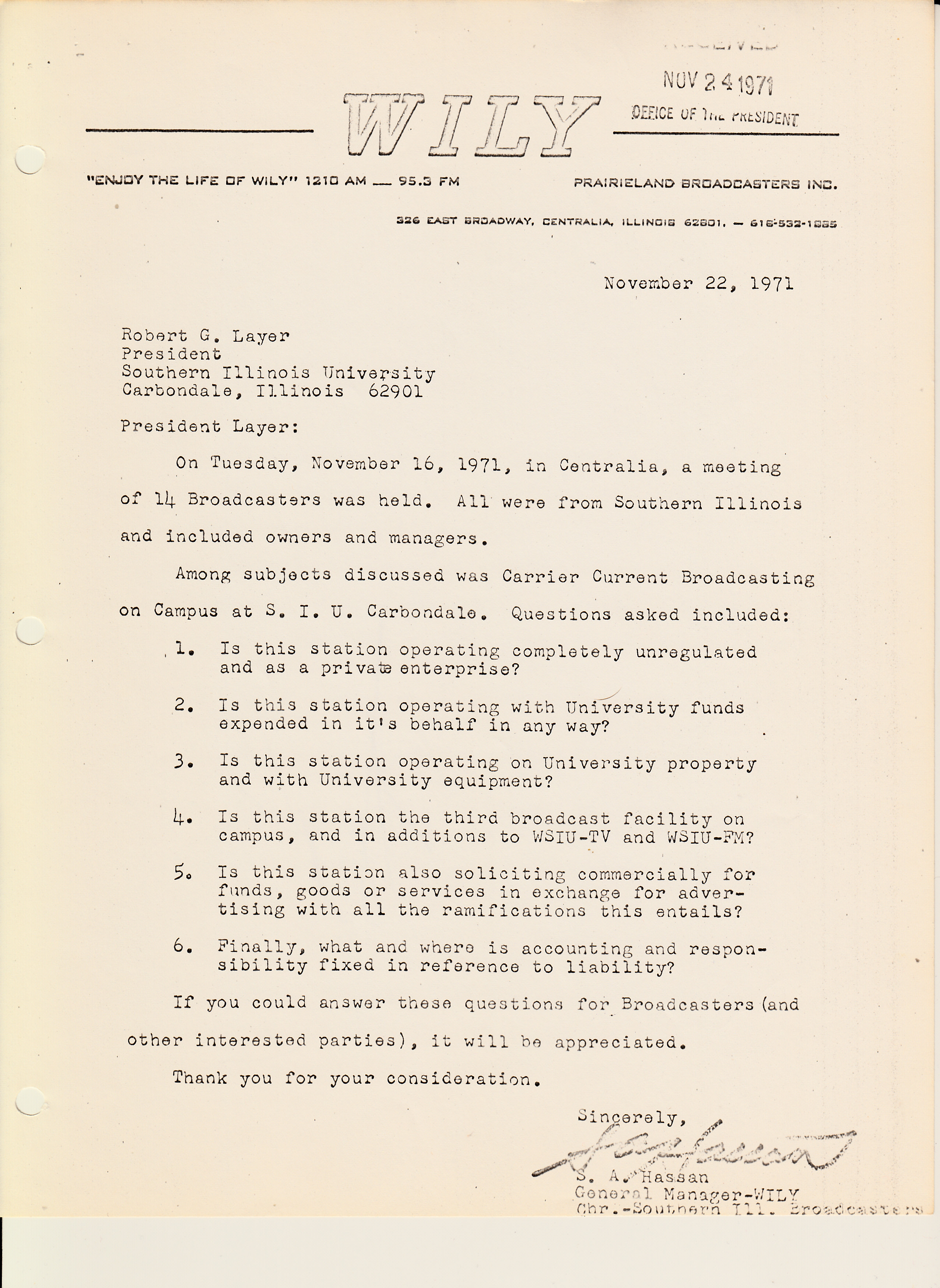CHAPTER 12
OPPOSITION GATHERS AND JOEL GETS ACTIVATED
Dr. Moulton returned from vacation and met with the area broadcasters August 18. The broadcasters claimed that the “tax subsidized” competition would put them out of business. They demanded to meet with the acting SIU president Robert G. Layer, which happened September 20, 1971.
The argument that WIDB selling time would put other stations out of business is also complete sophistry. WINI was a daytime AM whose signal barely reached Carbondale. Its format was “MOR-country” playing Dean Martin, Ferlin Husky, Robert Goulet, Perry Como, Jerry Vale, etc, with 30-40 minutes of commercials each hour. WCIL was about the same, except it featured shows like “Coffee with Larry” and “The Trading Post.” No students were listening longer than 30 seconds. (WCIL did have a mono FM that had a top-40 show at night, but they were not nearly as concerned, at first, as WINI).
The claim that they would go out of business from WIDB’s competition is like saying the sun won’t rise if WIDB advertises. It had never happened before, but why take a chance?
Joel tried logic. In other Illinois University towns, such as Champaign or DeKalb, there were no problems at all with a student open air station competing with the others. In fact, the Champaign commercial station owners Joel contacted scoffed at the claims and competence of the Southern Illinois Broadcasters. The Champaign owners said if the Southern Illinois owners can’t figure out a way to program to audience needs if other stations change the market, then those incompetent owners SHOULD go out of business and let someone else serve the public.
But the SIU administration had no interest in serving the public or serving students. The SIU administration was only interested in serving incompetent area broadcasters, a misuse of state funds for an unauthorized purpose completely contrary to their job descriptions and the state-mandated duties and purposes of the university.
Joel’s letter to Dr. Kurtz in July, 1971 showed a new and different Joel. Pretty much content to dutifully show up and do his weekly news shift and maybe attend a station party or two in March and April, now Joel was getting pissed off. Part of it was disbelief that a state-funded institution could so blatantly disregard its purpose and betray those it was paid to serve. Sometime during these summer and fall months of 1971, Joel became steadfast in his determination that they weren’t going to get away with it.
But in July, 1971, there was little Joel could do personally at that moment other than prepare the letter and stay in touch with Robbie and other staff heads who were all up north for the summer. Joel’s letter shows whom he cc’d, and it was the nucleus of WIDB at that time, who were also board members. Bob Huntington had become GM since Charlie had left. Robbie was included, as well as Tom Scheithe (Program Director) Dr. Dave Terwische (Faculty Advisor) and Jack Baier (Fiscal Officer).
Dean Moulton met with the area broadcasters on August 20. No one from WIDB was invited nor allowed to attend. The broadcasters wanted to meet with SIU President Layer and did so on September 20. No one from WIDB was invited or allowed to attend. The broadcasters continued to recruit and organize. Dale Atkins called station owners as far away as Centralia (100 miles from C’dale) and told them the state was trying to take away all of their money and property. The broadcasters continued to organize. They had a meeting in November 16 in Centralia (at WILY) and Mr. S. A. Hassan, General Manager of WILY, sent his letter to President Layer demanding answers about “carrier current broadcasting,” (WIDB was never mentioned by name).
It is doubtful that any of the “Southern Illinois Broadcasting Association” members had any idea how carrier current broadcasting worked nor what regulations did or didn’t apply. It is also likely that they had learned whatever they knew about radio from actual experience, not classroom training. Note the letter is on the WILY, Centralia letterhead and the so-called “Southern Illinois Broadcasters Association” had no letterhead and did not really exist.
The questions in the letter, all loaded and suggestive, very much parallel the feelings and concerns during the riots. Examples: (a) “Is the station operating completely unregulated…?; (b) “is the station operating with university funds…in university buildings…and university equipment;” (c) “is the station soliciting commercially…with all the ramifications this entails?;” (d) “Finally, what and where is the responsibility fixed in reference to liability?”
Earlier in this history it was established that as a result of the SIU riots (and other national events) many locals, administrators, and even legislators wanted the students to be “taught a lesson.” In the fall of 1971 the main riots had only been 18 months before (which is half a generation to 18 year olds, but very recent to locals). The language “completely unregulated” sounds suspiciously like the fears of student “chaos and anarchy” just a few months before. The phrase “…soliciting commercially…with all of the ramifications this entails” stokes paranoid fears of the unknown, especially at the end “…where is accounting and responsibility fixed for liability??”
So we have “completely unregulated…all the ramifications this entails…where is accounting, responsibility..and liability?” Translated: Students must be controlled…or else there will be upheavals and disasters (riots, chaos, anarchy, etc.)…you are with us or against us and we will hold YOU responsible if you are against us.
There is another factor to consider in perspective. Remember that although it was 1971, the university had less than 6,000 students and most of campus had not been built only 7 years before. Things had been pretty sleepy before that. So this big change was still pretty recent for the middle-aged locals. Area businessmen may have been intimidated by the huge influx of Chicago students (“outsiders”) and that may have been a factor.


